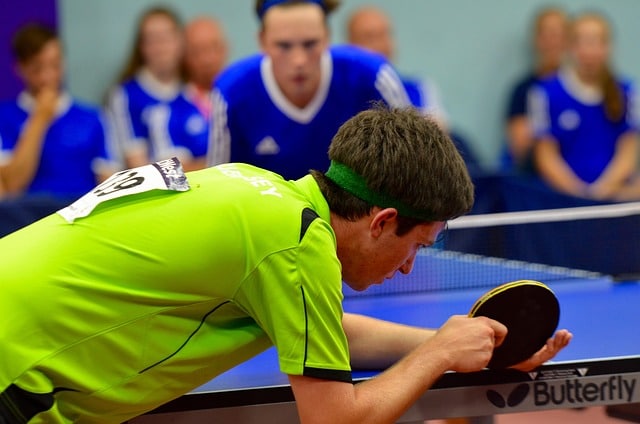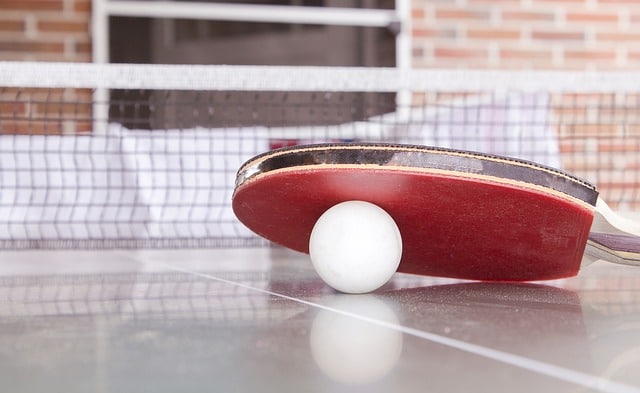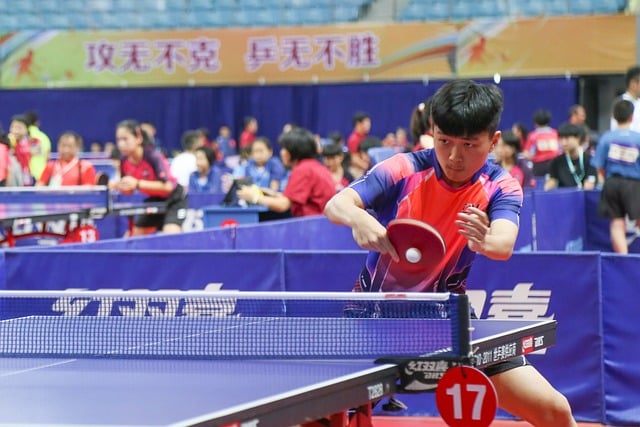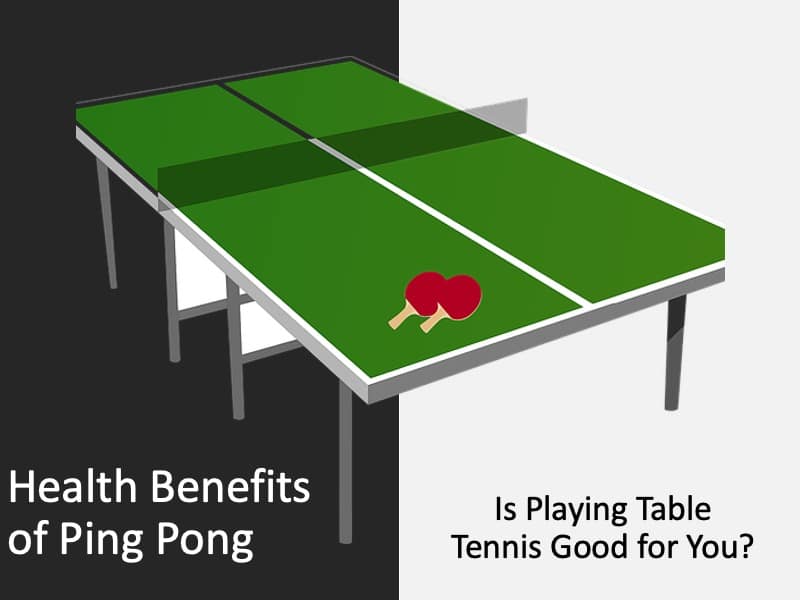Health Benefits of Ping Pong: Is Table Tennis Good for You?
Ping pong, also known as table tennis, is more than just a recreational game—it’s a sport with significant health benefits.
From developing motor skills and hand-eye coordination, to promoting cognitive function and social well-being, playing ping pong can be a highly effective way to stay active, improve coordination, and maintain mental sharpness.
I played a lot of ping pong growing up, and I’ve always credited it as a major factor in developing my hand-eye coordination and motor skills.
It was not just a fun way to pass the time indoors with my friends, but also an excellent workout that engaged my reflexes, reaction speed, and concentration.
Research now supports what I’ve long believed—ping pong is an underrated tool for improving both physical and mental health.
Is Ping Pong a Sport?

Yes, ping pong (or table tennis) is absolutely a sport—and an Olympic one at that! While many people see it as just a casual game played in basements, garages, or recreational centers, table tennis is recognized worldwide as a highly competitive, physically demanding, and skill-intensive sport.
Why Ping Pong Qualifies as a Sport
To define whether something is a sport, we typically look at these criteria:
- Physical exertion – Does it require movement, endurance, or physical skill?
- Rules and structure – Is it governed by official rules?
- Competitive nature – Can it be played at a professional or organized level?
- Official recognition – Is it acknowledged by sports organizations?
Ping pong checks all these boxes:
- Physical Exertion – Competitive table tennis involves quick lateral movements, rapid reflexes, and explosive bursts of speed, requiring both stamina and agility.
- Rules and Structure – The sport is governed by the International Table Tennis Federation (ITTF), which sets global rules and standards.
- Competitive Nature – Table tennis is played at the Olympics, World Championships, and professional leagues across the world.
- Official Recognition – The International Olympic Committee (IOC) recognizes table tennis as a legitimate competitive sport.
How Ping Pong Differs from Recreational Play
Many people associate ping pong with casual, backyard play, which can make it seem like just a fun activity rather than a serious sport. However, the professional game is vastly different:
- Speed & Reflexes – In professional table tennis, the ball can travel at speeds of over 60 mph, and players have only milliseconds to react.
- Endurance & Stamina – Matches can last up to seven games, requiring sustained focus and energy.
- Technique & Strategy – Professional players use spin, footwork, and precision to outmaneuver opponents.
Even though ping pong can be played casually, that doesn’t take away from the fact that it meets all the criteria of a legitimate sport.
Final Verdict: Ping Pong Is a Sport!
Whether played recreationally or at an elite level, ping pong is a sport that requires skill, strategy, and athleticism. It’s not just a game—it’s a highly competitive discipline recognized by international sports organizations, played at the highest levels, and enjoyed by millions worldwide.
Top 10 Health Benefits of Table Tennis

1.) Improves Hand-Eye Coordination and Motor Skills
Ping pong requires rapid reflexes, precise timing, and fine motor control, making it one of the best activities for hand-eye coordination.
Players must track the ball, adjust their movements accordingly, and execute controlled swings in real time.
A 2024 review highlighted how table tennis enhances executive function, motor skills, and coordination capacity in children and adolescents, particularly those with developmental conditions like ADHD, ASD, and DCD (Gonzalez-Devesa et al., 2024).
The rapid movements involved in the game help refine neuromuscular control, making it a valuable tool for improving dexterity in people of all ages.
Personally, I noticed that playing ping pong improved my ability to react quickly in sports, particularly basketball, where hand speed and coordination play a huge role in ball handling, shooting, rebounding and defending.
2.) Supports Cardiovascular and Muscular Fitness
Despite its small playing area, ping-pong provides an effective cardiovascular workout and is a great way to get fit without going to the gym.
A 2021 study published in the International Journal of Environmental Research and Public Health found that children who played table tennis regularly for two years exhibited superior physical fitness and bone development compared to those who weren’t engaged in general physical activity.
Table tennis may not seem as physically demanding as running or swimming, but it involves constant lateral movement, agility, and bursts of speed, which contribute to improved cardiovascular endurance and muscle tone.
Regular play can also help with:
- Leg and core strength from quick foot movements and maintaining balance.
- Forearm and shoulder strength from repeated paddle swings.
- Improved flexibility due to rapid body positioning and movement.
3.) Supports Cognitive Function and Mental Agility
Ping pong isn’t just a physical game—it’s a mental workout.
Players must anticipate shots, strategize, and make split-second decisions, all of which engage and strengthen the brain.
A 2018 study in the International Journal of Environmental Research and Public Health emphasized that table tennis helps with visual tracking, reaction time, and problem-solving, making it an ideal sport for maintaining cognitive sharpness.
Additionally, the rapid hand-eye coordination required can stimulate neuroplasticity—the brain’s ability to reorganize itself.
This is particularly beneficial for older adults who want to keep their minds sharp and reduce their risk of cognitive decline (Yamasaki, 2022).
4.) Promotes Social Well-Being and Workplace Productivity
Beyond physical and cognitive benefits, ping pong fosters social interaction and teamwork.
A 2020 study in the International Journal of Qualitative Studies on Health and Well-Being explored a workplace intervention where employees played table tennis regularly. The results showed:
- Increased social connectedness
- Improved work motivation and productivity
- Stronger sense of community among coworkers
Playing ping pong during breaks can reduce stress, encourage teamwork, and create an environment of friendly competition and camaraderie.
Whether in a workplace, recreational center, or at home, table tennis brings people together and enhances social engagement, which is crucial for overall mental health.
5.) Helps Maintain Bone Density and Prevents Age-Related Decline
For older adults, ping pong is a low-impact sport that supports bone health and muscle strength without excessive joint stress.
A 2018 study in the Journal of Musculoskeletal and Neuronal Interactions found that older men who played recreational table tennis had higher muscle strength, better physical function, and greater bone mineral density compared to their sedentary counterparts.
The short bursts of movement, directional changes, and weight-bearing impact help stimulate bone growth and preserve muscle mass, reducing the risk of osteoporosis and age-related frailty.
6. A Fun, Accessible, and Inclusive Sport

Unlike many other sports, ping pong is:
- Low-impact, making it suitable for people of all fitness levels.
- Space-efficient, requiring only a small table.
- Easy to learn, allowing beginners to quickly improve and enjoy the game.
7.) Reduces Stress and Improves Mood
Ping pong is an excellent way to relieve stress and boost mental well-being.
The combination of physical movement, focus, and social interaction helps release endorphins—the body’s natural feel-good chemicals—leading to improved mood and reduced anxiety.
The game’s social aspect, along with its fast-paced nature, helps distract from daily worries and promotes a sense of relaxation and fun.
From personal experience, I found that playing ping pong was one of the best ways to clear my mind and reset after a long day. The constant movement and focus kept me engaged, helping me feel refreshed afterward.
8.) Develops Balance and Coordination
Table tennis requires constant weight shifts, quick movements, and dynamic balance adjustments, which improve overall coordination and stability.
This is especially beneficial for older adults, as maintaining balance and agility can help prevent falls and injuries.
The 2018 study in the Journal of Musculoskeletal and Neuronal Interactions showed that older adults who played table tennis had better balance and mobility compared to sedentary individuals.
The game encourages core stability, quick footwork, and controlled body movements, all of which contribute to improved overall coordination and fall prevention.
For younger athletes, developing these skills through ping pong can also enhance performance in other sports, making it a great cross-training tool.
9.) Supports Weight Management and Calorie Burning
Although ping pong is a low-impact sport, it can be an effective way to burn calories and support weight management.
Depending on the intensity of play, a person can burn between 200-500 calories per hour, making it comparable to brisk walking or light jogging.
A 2021 study in the International Journal of Environmental Research and Public Health found that children who played table tennis regularly had better body composition, lower fat mass, and improved cardiovascular fitness compared to those who didn’t engag in general physical activity.
Because it’s so engaging and fast-paced, playing ping pong doesn’t feel like a workout, making it easier for people to stay active and maintain a healthy weight without the boredom of traditional exercise.
10.) Encourages Lifelong Physical Activity
One of the greatest benefits of ping pong is that it is a sport for all ages.
Unlike high-impact activities like running or contact sports, table tennis can be played from childhood to old age, making it an excellent lifelong fitness option.
Studies have shown that maintaining an active lifestyle is crucial for long-term health, disease prevention, and longevity.
Ping pong offers a unique blend of physical exercise, mental engagement, and social interaction, helping people stay active well into their later years.
Additionally, since ping pong can be played recreationally or competitively, it provides a sustainable way to stay physically and mentally engaged throughout life.
Final Thoughts: Is Playing Ping Pong Good for You?

Ping pong is more than just a fun recreational activity—it’s a sport that offers comprehensive health benefits, from improving motor skills and cognitive function to enhancing cardiovascular fitness and social well-being.
Growing up, I played countless hours of ping pong, and I still believe it helped me develop faster reflexes, better coordination, and a competitive mindset that translated into my basketball career.
The science now backs up these experiences, proving that table tennis is an incredibly effective way to boost both physical and mental health at any age.
If you’re looking for a fun, engaging, and accessible way to stay active, grab a paddle and start playing!
Whether for fitness, mental agility, or social interaction, ping pong is an excellent addition to a healthy lifestyle.
This website does not provide medical advice. This website site does contain affiliate links, and purchases may earn a commission.
Read my Medical Disclaimer, Review Disclaimer, and Publishing Policies for more details. Use of this site indicates acceptance of these terms.



